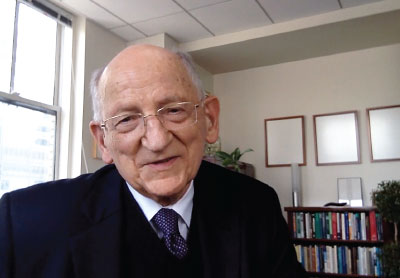Love Pathology in Narcissistic Patients Can Be Treated Effectively
Abstract
Patients with narcissistic personality disorder often do not experience love without intense treatment.

The lack of capacity to love in patients with narcissistic personality disorder is such a constant element of their lives that they cannot avoid it in the long run and often seek treatment later in life, says Otto Kernberg, M.D.
Patients with a narcissistic personality disorder often struggle to develop normal love relations. But Otto Kernberg, M.D., explained how therapists can effectively treat this aspect of their patients’ symptomology in a presentation at the virtual APA Spring Highlights Meeting in April. Kernberg is the director of the Personality Disorders Institute at the NewYork-Presbyterian Westchester Behavioral Health Center and a professor of psychiatry at Weill Cornell Medicine.
The most important symptom in the area of love relations for patients with narcissistic personality disorder, Kernberg said, is their incapacity to love. These patients’ past relationships are often characterized by brief infatuations and sexual promiscuity with multiple partners, not long-term relationships.
The desire to feel superior—a dominant aspect of the narcissistic symptomology—often extends into these patients’ love lives. They may constantly compare their partners with other people to ensure they have the most attractive partner or use sexual experiences to reassure themselves when they feel inferior.
“Sexual encounters, sexual conquests, and defeat of sexual rivals constitute an important part of the sexual promiscuity of these patients,” Kernberg said.
If these patients do enter long-term relationships, they often idealize those relationships initially before growing bored. They are neither interested in nor capable of empathizing with their partners, Kernberg said. “They cannot depend on their partners nor tolerate dependency on themselves because that seems like an exploitation,” he said.
Patients may eventually try to explain away their inability to love with personal myths, often related to fear of abandonment or past mistreatment. They might try to compensate for the sense of emptiness they feel with activities such as drug or alcohol use or participation in dangerous sports.
Ultimately, the most significant symptom for patients in this area—their inability to love—is often what drives them to seek treatment. Usually they do so later in life, once they’re in their 40s or 50s when they realize friends and family members have developed a rich love life that they don’t share.
There are multiple elements of these patients’ personalities that bode well for treatment. If, for example, they show empathy in nonsexual relations, are concerned over their loneliness, have a painful envy of those who can love, or illustrate that they’re capable of idealizing other areas of their lives such as their profession, art, politics, culture, or religion, their prognosis may be quite good, Kernberg said.
In terms of treatment, Kernberg explained that the pathology related to love relations does not respond well to cognitive-behavioral psychotherapy, which does not change the internal disposition to love. To encourage such a change, the psychiatrist must analyze transference in the therapeutic relationship, such as through transference-focused psychotherapy.
Through transference-focused psychotherapy, all qualities that unconsciously spoil patients’ capacity to love are activated in the therapeutic relationship. For example, patients may idealize the relationship with the therapist, attempt to control the relationship, or try to extract knowledge from the therapist without becoming emotionally involved. “These patients typically show what is called negative therapeutic reactions, meaning they feel worse after sessions have helped them because of unconscious envy of the therapist’s capacity to help them,” Kernberg said.
Gradually, the therapist and the patient can explore and resolve the patient’s symptoms. Patients may become aware over time of their aggressive efforts to devaluate the therapist or develop feelings of guilt and remorse that permit them to develop new emotions in therapy that can be transferred to their relationship with their significant others in reality.
“It is a difficult, complicated treatment requiring a long and specific training of the therapist,” Kernberg said.
The gender of the therapist may impact treatment, he said. A male patient with narcissist personality disorder may attempt to seduce a female therapist as a way of controlling her and exhibiting his superiority. The same may occur with a female patient and male therapist, though the patient may attempt to play a more dependent role, insinuating that the therapist will solve all her problems. A heterosexual woman with a male therapist, however, often doesn’t develop erotic feelings because to do so would put herself into an inferior position, Kernberg noted.
During the era of the COVID-19 pandemic when psychiatrists must rely on telemedicine to provide care to patients, Kernberg said treatment is still very effective. In fact, after a few sessions the psychiatrist may forget he or she is not seeing the patient face to face. “It becomes intensely personal,” he said. ■



